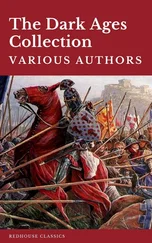It has often been alleged that Christianity in its political effects was a disintegrating force and tended to weaken the power of Rome to resist her enemies. It is difficult to see that it had any such tendency, so long as the Church itself was united. Theological heresies were indeed to prove a disintegrating force in the East in the seventh century, when differences in doctrine which had alienated the Christians in Egypt and Syria from the government of Constantine facilitated the conquests of the Saracens. But, after the defeat of Arianism, there was no such vital or deep-reaching division in the West, and the effect of Christianity was to unite, not to sever, to check, rather than to emphasise, national or sectional feeling. In the political calculations of Constantine it was probably this ideal of unity, as a counterpoise to the centrifugal tendencies which had been clearly revealed in the third century, that was the great recommendation of the religion which he raised to power. 108Nor is there the least reason to suppose that Christian teaching had the practical effect of making men less loyal to the Empire or less ready to defend it. The Christians were as pugnacious as the pagans. Some might read Augustine’s City of God with edification, but probably very few interpreted its theory with such strict practical logic as to be indifferent to the safety of the Empire. Hardly the author himself, though this has been disputed.
It was not long after Alaric’s capture of Rome that Volusian, a pagan senator of a distinguished family, 109whose mother was a Christian and a friend of Augustine, proposed the question whether the teaching of Christianity is not fatal to the welfare of a State, because a Christian smitten on one cheek would if he followed the precepts of the Gospel turn the other to the smiter. We have the letter 110in which Augustine answers the question and skilfully explains the texts so as to render it consistent with common sense. And to show that warfare is not forbidden another text is quoted in which soldiers who ask “What shall we do?” are bidden to “Do violence to no man, neither accuse any falsely, and be content with your wages.” They are not told not to serve or fight. The bishop goes on to suggest that those who wage a just war are really acting misericorditer , in a spirit of mercy and kindness to their enemies, as it is to the true interests of their enemies that their vices should be corrected. Augustine’s misericorditer laid down unintentionally a dangerous and hypocritical doctrine for the justification of war, the same principle which was used for justifying the Inquisition. But his definite statement that the Christian discipline does not condemn all wars was equivalent to saying that Christians were bound as much as pagans to defend Rome against the barbarians. And this was the general view. All the leading Churchmen of the fifth century were devoted to the Imperial idea, and when they worked for peace or compromise, as they often did, it was always when the cause of the barbarians was in the ascendant and resistance seemed hopeless. 111
The truth is that the success of the barbarians in penetrating and founding states in the western provinces cannot be explained by any general consideration. It is accounted for by the actual events and would be clearer if the story were known more fully. The gradual collapse of the Roman power in this section of the Empire was the consequence of a series of contingent events. No general causes can be assigned that made it inevitable.
The first contingency was the irruption of the Huns into Europe, an event resulting from causes which were quite independent of the weakness or strength of the Roman Empire. It drove the Visigoths into the Illyrian provinces, and the difficult situation was unhappily mismanaged. One Emperor was defeated and lost his life; it was his own fault. That disaster, which need not have occurred, was a second contingency. 112His successor allowed a whole federate nation to settle on provincial soil; he took the line of least resistance and established an unfortunate precedent. He did not foresee consequences which, if he had lived ten or twenty years longer, might not have ensued. His death was a third contingency. But the situation need have given no reason for grave alarm if the succession had passed to an Emperor like himself, or Valentinian I, or even Gratian. Such a man was not procreated by Theodosius and the government of the West was inherited by a feeble-minded boy. That was a fourth event, dependent on causes which had nothing to do with the condition of the Empire.
In themselves these events need not have led to disaster. If the guardian of Honorius and director of his government had been a man of Roman birth and tradition, who commanded the public confidence, a man such as Honorius himself was afterwards to find in Constantius and his successor in Aetius, all might have been tolerably well. But there was a point of weakness in the Imperial system, the practice of elevating Germans to the highest posts of command in the army. It had grown up under Valentinian I, Gratian, and Theodosius; it had led to the rebellion of Maximus, and had cost Valentinian II his life. The German in whom Theodosius reposed his confidence and who assumed the control of affairs on his death probably believed that he was serving Rome faithfully, but it was a singular misfortune that at a critical moment when the Empire had to be defended not only against Germans without but against a German nation which had penetrated inside, the responsibility should have devolved upon a German. Stilicho did not intend to be a traitor, but his policy was as calamitous as if he had planned deliberate treachery. For it meant civil war. The dissatisfaction of the Romans in the West was expressed in the rebellion of Constantine, the successor of Maximus, and if Stilicho had had his way the soldiers of Honorius and of Arcadius would have been killing one another for the possession of Illyricum. When he died the mischief was done; Goths had Italy at their mercy, Gaul and Spain were overrun by other peoples. His Roman successors could not undo the results of events which need never have happened.
The supremacy of a Stilicho was due to the fact that the defence of the Empire had come to depend on the enrolment of barbarians, in large numbers, in the army, and that it was necessary to render the service attractive to them by the prospect of power and wealth. This was, of course, a consequence of the decline in military spirit, and of depopulation, in the old civilised Mediterranean countries. The Germans in high command had been useful, but the dangers involved in the policy had been shown in the cases of Merobaudes and Arbogastes. Yet this policy need not have led to the dismemberment of the Empire, and but for that series of chances its western provinces would not have been converted, as and when they were, into German kingdoms. It may be said that a German penetration of western Europe must ultimately have come about. But even if that were certain, it might have happened in another way, at a later time, more gradually, and with less violence. The point of the present contention is that Rome’s loss of her provinces in the fifth century was not an “inevitable effect of any of those features which have been rightly or wrongly described as causes or consequences of her general ‘decline.’ ” The central fact that Rome could not dispense with the help of barbarians for her wars ( gentium barbararum auxilio indigemus ) may be held to be the cause of her calamities, but it was a weakness which might have continued to be far short of fatal but for the sequence of contingencies pointed out above.
CHAPTER X: LEO I AND RICIMER’S RULE IN ITALY
Читать дальше












